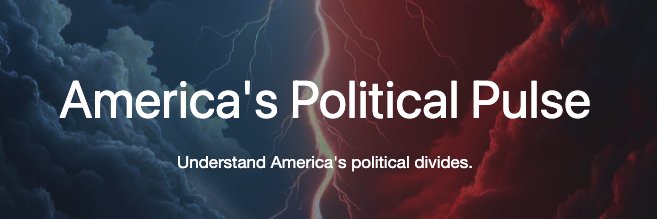
Polarization Research Lab
@PRL_Tweets
We produce research and public resources on democratic attitudes and political behavior. Founder/Director @seanjwestwood and co-director @ylelkes.
Is there a strong case for AI helping, rather than harming, the accuracy of people's beliefs about contentious topics? In this @NatureMedicine piece (focusing on vaccination), I argue the answer is YES. And it boils down to how LLMs differ from other sources of information.
While liberals have moved almost a full scale point more supportive of free trade since the election (on a 7pt scale) conservatives are unmoved. A super interesting case for the role of elites in shaping mass attitudes. Data from the incredible @PRL_Tweets Political Pulse.
🚨 New paper in @ScienceAdvances Can changing how we argue about politics online improve the quality of replies we get? @THeideJorgensen, @a_rasmussen, and I use an LLM to manipulate counter-arguments to see how people respond to different approaches to arguments. Thread 🧵1/n
Here's a treat for state politics and policy researchers. Ethan Dee and I published a dataset in Nature: Scientific Data with 1.36 million state legislative bills since ~2009 coded by 28 policy areas. We used a machine learning model built off open source components.
Today (w/ @UniofOxford @Stanford @MIT @LSEnews) we’re sharing the results of the largest AI persuasion experiments to date: 76k participants, 19 LLMs, 707 political issues. We examine “levers” of AI persuasion: model scale, post-training, prompting, personalization, & more 🧵
🚨New paper in @TrendsCognSci 🚨 Why do some ideas spread widely, while others fail to catch on? @Jayvanbavel and I review the “psychology of virality,” or the psychological and structural factors that shape information spread online and offline. Thread 🧵(1/n)
💸 How should scholars measure early money in campaigns? Our new @PSRMJournal article in FirstView (w/ @colinrcase) offers a theoretical and empirical framework, as well as practical guidance for working with FEC data 🔗doi.org/10.1017/psrm.2…
.@PRL_Tweets just took 10 students to DC to meet people with vastly different political views—from Fox News producers to think tank researchers. They learned even people they disagree with can still be "thoughtful, principled, motivated, and intelligent." bit.ly/466IjHY
PRL brought 10 Dartmouth undergraduates to DC in June to introduce them to people and orgs across the political spectrum working for democracy. Many thanks to those who hosted us!! Democracy Fellows Explore How to Bridge the Partisan Divide home.dartmouth.edu/news/2025/07/d…

📢 Thrilled to share our new article introducing CampaignView—a comprehensive open-source dataset of congressional candidate campaign bios and policy platforms (2018–2022). Paper + data here: campaignview.org & doi.org/10.7910/DVN/JI… 🧵1/4
🔥New paper in @PNASNexus with @M_B_Petersen "Motivations to connect with like-minded audiences increase partisan sharing on social media" academic.oup.com/pnasnexus/arti…
With TWCF funding, a research team is studying the nature and consequences of political polarization in the United States and globally. @seanjwestwood joins @StoriesOfImpac_ to discuss what he and his team at @PRL_Tweets have found so far: templetonworldcharity.org/blog/what-pola…
I've launched a new website where anyone can interactively visualize ticket-splitting rates from actual ballots (cast vote records) for any pair of contests on the 2020 Georgia ballot. Check it out! ballots.isps.yale.edu
New on protest participation from Seth Warner in Social Forces. He finds that partisan animosity explains almost as much variation as concern about the issues being protested, e.g., participation in environmental protests is about the GOP. academic.oup.com/sf/advance-art…

Americans are polarized on how they think the economy has performed since Trump's election. More than 6 months on, we see Democrats moving from feeling somewhat good to bad and Republicans from bad to good. Data at americaspoliticalpulse.com/citizens/us-po…

Thinking about immigration from a cultural perspective heightens distrust of political opponents, as discussed in our recent @BJPolS. Might interest scholars of affective polarization and ideology, as well as those analyzing open-ended survey questions. cup.org/3ZajcQ1
New from @StandTogether: @seanjwestwood of @PRL_Tweets lays out five questions Americans can ask themselves to move out of extreme, black-and-white thinking and into a world where disagreements can be productive: standtogether.org/stories/consti…
nearly all LLM AI models are perceived as significantly left-leaning, even by many Democrats, across many value-laden political topics. when models are prompted to take a neutral stance, they offer more ambivalence & are perceived as more neutral modelslant.com/paper.pdf
See below for a thread on our new working paper on the 2024 congressional primary and general elections. Feedback welcome!
🚨NEW PAPER: Why are Members of Congress so extreme? We conducted a 4-wave panel of thousands of voters in 27 districts during last year’s primary AND general elections to trace polarization’s roots The results challenge conventional wisdom… and suggest lessons for parties🧵👇
The courts are trying to constrain Trump, but our polling data show that Republicans are pushing back with growing support for *ignoring* court rulings. Link to data and report in the next post.